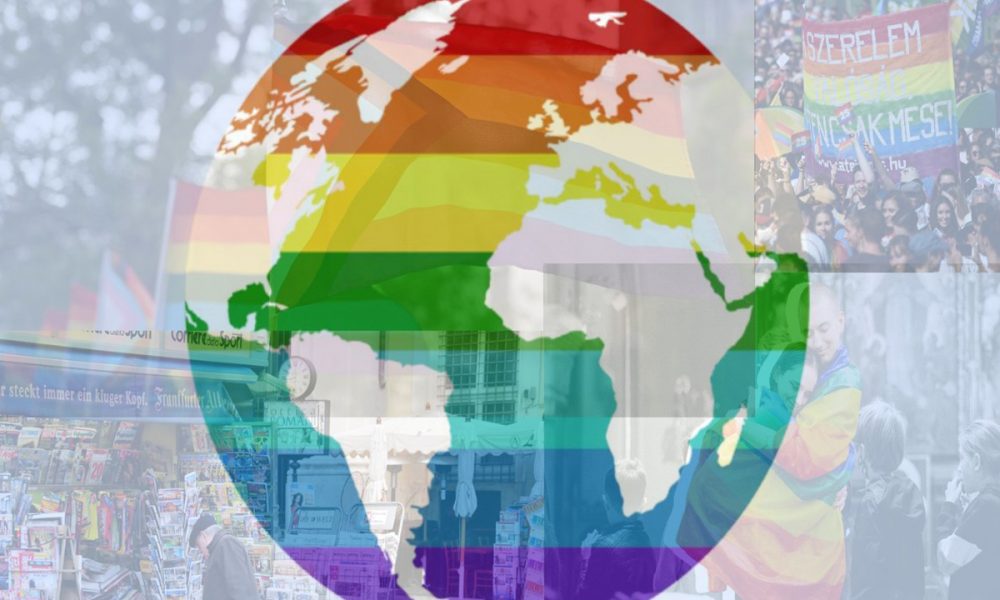World
Out in the World: News from Asia, Europe, and Australia

In the vast expanse of India, a land steeped in ancient wisdom and culture, where the echoes of tradition sing of respect for all beings, there exists a paradox. Transgender people, known as hijras, for millennia have been woven into the fabric of society, acknowledged, even revered. Yet today, this same community stands on the precipice of suffering, their dignity bruised, their existence imperiled.
Despite the Supreme Court rulings and the Transgender Persons (Protection of Rights) Act of 2019, discrimination festers and crimes against trans people continue to rise unchecked.
The 2019 law, once a beacon of hope, now seems a faint whisper amid societal prejudice. India, for all its storied past, must reckon with the reality that its ancient recognition means little if the present offers only misery.
The figures, as the National Crime Record Bureau presents, suggest a seemingly low rate of crime against trans people. At a glance, one might draw comfort from these numbers, imagining progress in a society long burdened by prejudice. But beneath this veneer lies a graver truth: Activists, ever watchful and weary, suspect gross underreporting. The numbers, it seems, tell only half the story.
In the sprawling ledger of tragedy that is the Crimes in India: 2022 report, the NCRB lists 29,356 souls lost to murder, and only nine of these were trans people. A mere number on a page, some might say. But this figure, far from reassuring, is chilling in its implication.
Among the grim tally of 110,140 cases of adult kidnapping and abduction, only one trans victim emerges from the records — a stark and haunting singularity. The NCRB reports no instances of rape, sexual assault, or mob lynching involving trans people. This absence is, however, not a triumph, but a troubling silence. It raises the question: Do these crimes not occur, or do they vanish from the pages of the records? The silence of statistics can be as deafening as the violence they fail to capture.
Another NCRB report lists only 236 trans people as victims of rape — an astonishingly low figure in a landscape where so much remains hidden. The report does not include any cases of rape, nor the heinous crimes of buying or selling minors for prostitution, in which trans people were victims. The true scale of suffering, it seems, remains buried beneath a system that fails to recognize or record their plight fully.
Parliament passed trans rights law in 2019
Parliament on Nov. 26, 2019, took what seemed a bold step towards justice when it passed the Transgender Persons (Protection of Rights) Bill.
The law, as written, promised protection and welfare for India’s trans community, declaring that crimes against them that range from forced labor, to denial of access to public spaces, and even removal from households and villages, would not be tolerated. The law also acknowledged physical, sexual, verbal, emotional, or economic abuse as offenses.
Penalties for these offenses — forced labor, denial of rights, or various forms of abuse — under the law are modest at best, ranging from six months to two years’ imprisonment, along with a fine.
India in recent years has seen a disturbing rise in cases of mob lynching against trans persons. One such tragic incident occurred on Feb. 13, 2024. Raju, a 50-year-old trans person from Telangana state’s Nizamabad district, fell victim to brutal mob violence after a false rumor of child kidnapping swept through their village — a village they had called home.
Raju, a cattle herder and beggar, was simply trying to make ends meet when the mob, blinded by fear and ignorance, turned on them.
Authorities would later clear Raju’s name, confirming they had no involvement in any such crimes. But the truth came too late. Raju had succumbed to their injuries by the time they reached the local hospital, a life senselessly lost to hysteria and hatred.
A similar tragedy unfolded in Hyderabad in 2018.
Rumors of child kidnapping and burglary sparked fear and suspicion, culminating in a brutal attack on a group of trans people. One was killed, and another severely injured as the mob, driven by unfounded accusations, unleashed their violence.
A group of Kanwariyas, devotees of Lord Shiva on a sacred pilgrimage, on July 29 brutally beat a trans woman in Uttar Pradesh state and ripped her clothes off after they wrongly suspected her of theft. The woman’s fate seemed sealed as the mob grew angrier, but authorities intervened in time. They rescued her and brought her to a police station. Authorities confirmed what the frenzy of the mob had failed to see: She was not a thief, merely another victim of suspicion and violence.
A group of trans women on Aug. 16 set out for RG Kar Medical College to join a protest against the West Bengal government, outraged by the gang rape of a trainee doctor at the hospital. Their journey, however, took a dark turn at the Rabindra Sadan metro station.
One of the trans women alleged a Railway Protection Force officer, under the pretense of “checking” her gender, groped her. The group later filed a case against him, exposing yet another instance of indignity faced by trans people in public spaces where even their very identity is subject to humiliating scrutiny.
Report: 92 percent of trans people have faced physical or verbal abuse
Souvik Saha, founder of Jamshedpur Queer Circle, an LGBTQ organization working on a grassroots level to bridge the gap by conducting sensitization workshops with law enforcement agencies and local communities to foster greater understanding and inclusivity, highlighted to the Washington Blade the severe challenges that trans people in Jharkhand state and across India face.
He noted trans people often encounter hostility, harassment, and dismissive attitudes from the police when they try to file First Information Reports. Shah said the crux of the problem lays in the lack of sensitization and awareness within the police force regarding trans identities. This systemic issue not only discourages the community from seeking justice but also perpetuates the cycle of abuse and marginalization they endure.
“As the founder of Jamshedpur Queer Circle, we have witnessed firsthand the systemic discrimination faced by transgender individuals, particularly when they attempt to interact with law enforcement,” said Saha.
“A report by the National Human Rights Commission (NHRC) in 2018 highlights that 92 percent of transgender individuals have faced physical or verbal abuse, often by law enforcement officials themselves,” he added. “Many police stations lack gender sensitization programs that could foster respect and professionalism when interacting with LGBTQ individuals. As a result, transgender individuals are deterred from seeking justice, and crimes against them often go unreported or uninvestigated.”
Saha highlighted a particularly troubling case involving a trans woman in Jharkhand who officers relentlessly mocked when she attempted to file a domestic violence complaint at a local police station. Saha said her ordeal is a glaring example of how law enforcement practices not only fail to protect trans people but actively alienate and further victimize them.
Saha remarked that NCRB data showing 236 trans victims without any registered cases is both alarming and unsurprising. He emphasized this statistic starkly reflects the deep-seated systemic issues that prevent trans individuals from accessing justice.
Saha added the barriers to reporting crimes, combined with a lack of trust in law enforcement, create an environment where many victims remain unheard of and their cases unrecorded.
“While the Supreme Court’s NALSA judgment in 2014 and the subsequent Transgender Persons (Protection of Rights) Act, 2019, were landmark decisions for the transgender community, the reality on the ground tells a different story,” he said. “Despite these legal protections, violence against transgender individuals persists due to deeply ingrained social prejudices, lack of awareness, and failure in the implementation of these laws.”
Saha added one “of the biggest issues is the gap between policy and practice. Although the law mandates the protection of transgender individuals, societal attitudes are slow to change.”
He pointed to a 2018 International Commission of Jurists study that notes 73 percent of trans people said they have experienced violence from family members, while 47 percent faced physical assault from members of the public.
“Even though the legal framework exists, enforcement agencies and local administrations often lack the willingness or training to implement it effectively,” said Saha.
He told the Blade that his organization has encountered numerous cases where authorities did not respond to trans people who faced mob violence or domestic abuse. Saha emphasized societal stigma and deep-rooted biases, reinforced by inadequate law enforcement, contribute to ongoing violence and discrimination against the transgender community.
“As a society, we need more awareness campaigns, stricter enforcement mechanisms, and a cultural shift to create an environment where transgender individuals feel safe and respected,” he said.
Without these changes, he warned, the cycle of marginalization will persist.
Kalki Subramaniam, a trans activist, queer artist and actor who is a member of the National Transgender Council, during an interview with the Blade discussed the mistreatment of trans people in police stations across India.
She said law enforcement often do not treat trans people with dignity.
“When a trans woman is raped, her FIR is almost never registered,” added Subramaniam. “That could be because the police are not sensitized enough about transgender people around the country.”
“Across the country, the situation is the same,” she told the Blade. “Even though there are lots of changes legally, police personnel need to be sensitized on a wider network. A few states have done some work, but the majority of Indian states have not.”
Subramaniam in response to the reported number of trans rape victims expressed deep shock, emphasizing violence against the trans community is widespread across India. She pointed out the figures only represent documented cases, while hundreds of crimes — particularly violence and rape — remain unreported and undocumented.
Subramaniam highlighted the persistent stereotyping of trans individuals, adding only extensive government-led sensitization programs can undo it.
“As a member of the National Transgender Council under the Ministry of Social Justice, I have already emphasized in meetings that all ministries and departments must be sensitized on transgender rights and issues,” said Subramaniam. “Once again, I will talk about the rape issue in the meeting in the ministry.”
Ankush Kumar is a reporter who has covered many stories for Washington and Los Angeles Blades from Iran, India, and Singapore. He recently reported for the Daily Beast. He can be reached at [email protected]. He is on Twitter at @mohitkopinion.










